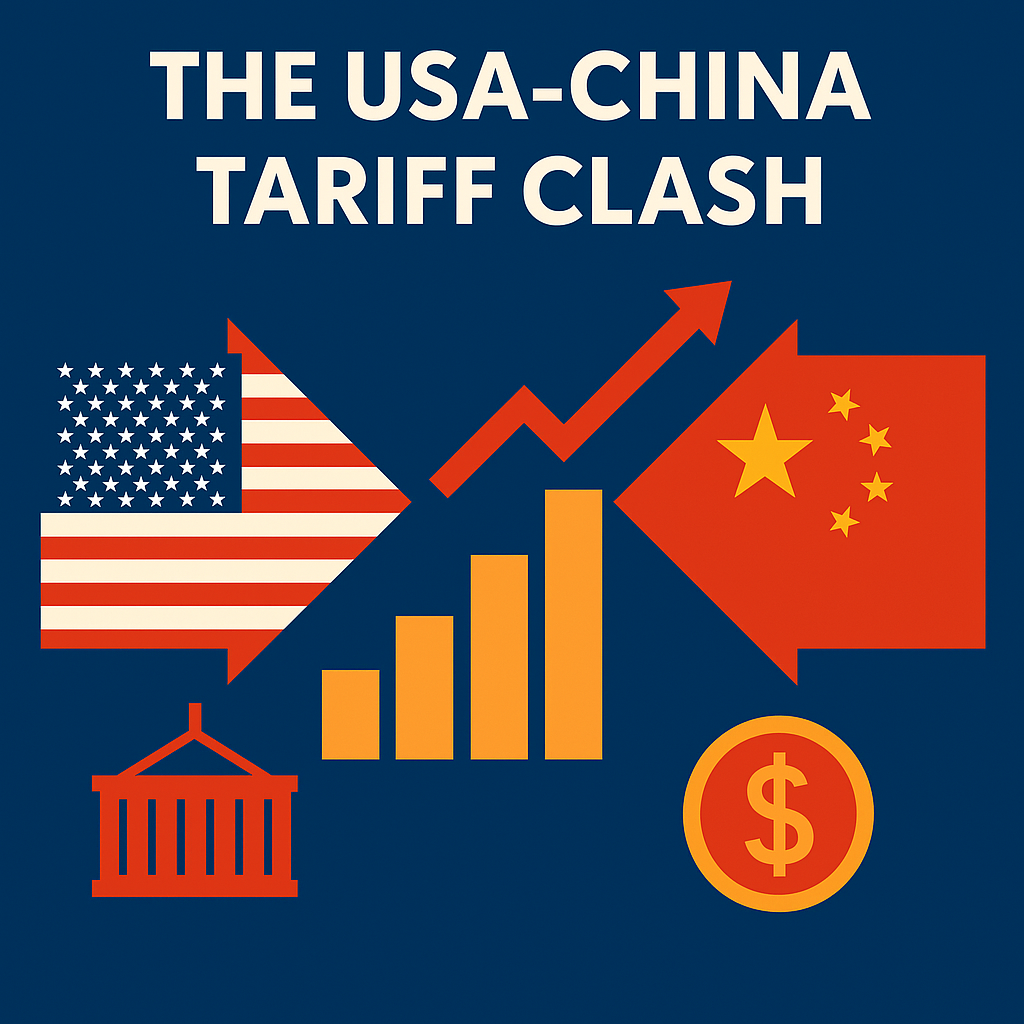Introduction
In 2025, the trade tensions between the United States and China have once again escalated, reigniting concerns about global supply chains, consumer prices, and market volatility. With both countries reintroducing and expanding tariffs on hundreds of goods, this economic tug-of-war isn’t just a geopolitical headline — it directly affects everyday Americans, investors, and businesses around the globe.
In this article, we’ll break down the background of the USA-China tariff clash, what the current situation looks like, and most importantly, how it can impact your personal finances and investment strategy in 2025.

A Quick Recap: What Are Tariffs?
Tariffs are essentially taxes placed on imported goods. When the U.S. imposes a tariff on Chinese products, it makes those goods more expensive to import, and vice versa. While the intention is often to protect domestic industries or respond to unfair trade practices, the cost is usually passed on to businesses and consumers.
The 2025 Tariff Clash: What’s Happening Now?
After a few years of relative calm following the 2018–2020 trade war, tensions have resurfaced. Here’s what’s driving the new clash:
- Technology and Semiconductors: The U.S. has restricted Chinese access to advanced semiconductors and imposed tariffs on high-tech imports. China responded with new tariffs on American tech components and agricultural goods.
- EV and Green Energy Race: As both nations race to dominate electric vehicles (EVs) and renewable energy markets, each has introduced tariffs to shield their industries from foreign competition.
- National Security Concerns: The Biden administration, followed by continued policy enforcement in 2025, has emphasized safeguarding national security through economic measures — a strategy mirrored by China.
In response, the U.S. announced tariffs on $30 billion worth of Chinese imports in early 2025, with China retaliating with duties on $20 billion of American goods.
How This Affects You: From Prices to Portfolios
1. Rising Consumer Prices
Many of the goods affected by tariffs — electronics, clothing, home appliances, and food items — are everyday essentials. Higher import costs are passed to consumers, which means your next smartphone, winter jacket, or even a bag of soybeans could be more expensive.
2. Stock Market Volatility
Tariff news creates uncertainty, and markets don’t like uncertainty. We’ve seen:
- Drops in Tech Stocks: Apple, Tesla, and other U.S. companies heavily reliant on Chinese suppliers or customers have experienced sharp fluctuations.
- Manufacturing and Export Sector Shocks: Both Chinese and American manufacturers face supply disruptions and rising costs.
As an investor, it’s critical to watch sectors affected by tariffs and consider diversifying across regions and industries.
3. Investment Opportunities
Believe it or not, tariff clashes can also create new opportunities:
- Domestic Manufacturing Stocks: U.S. companies producing goods domestically may benefit from reduced competition.
- Emerging Markets: Some businesses are shifting production to Vietnam, India, and Mexico — presenting new markets for investment.
- Commodity Investments: Agricultural commodities like soybeans, corn, and metals are influenced by trade dynamics, potentially offering short-term gains for savvy investors.
What Should Investors Do?
Here’s a strategic approach to navigating the tariff clash:
✔ Diversify Internationally
Don’t put all your capital into U.S.-China-dependent companies. Look at ETFs and mutual funds with broader global exposure.
✔ Watch Supply Chain Trends
Invest in companies with resilient, diversified supply chains. Avoid those overly dependent on one region for production.
✔ Hedge Against Inflation
With tariffs driving up prices, consider assets that protect against inflation, like Treasury Inflation-Protected Securities (TIPS), real estate, or commodities.
✔ Stay Informed, Not Reactive
Follow credible financial news and trade policy updates — but avoid panic-selling during market dips caused by tariff headlines.
Conclusion
The USA-China tariff clash is more than a political spat — it’s a key factor shaping the global economy in 2025. Whether you’re a consumer feeling the pinch at the checkout counter or an investor watching your portfolio’s performance, it pays to stay aware of how tariffs impact the broader economic landscape.
By understanding the implications and positioning your finances accordingly, you can turn uncertainty into opportunity and protect your wealth in the face of international tension.
Want more insights on how global economics impact your personal finances?
Subscribe to TheFirstCent for weekly updates, investing tips, and practical financial strategies.
